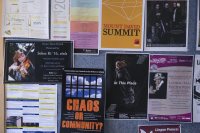
Convocation 2012 reveals common ground in art of compromise
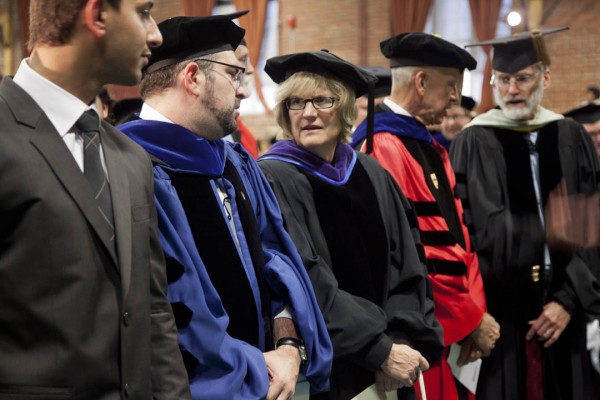
From left, Convocation speakers Umar Khan ’13, professor Stephen Engel and Bates President Clayton Spencer chat prior to Convocation 2012. Also shown are professors Sawyer Sylvester and Thomas Tracy. Photograph by Phyllis Graber Jensen/Bates College.
Telling the Class of 2016 that there is no higher reward than to work with passion and purpose, President Clayton Spencer offered as an example a mentor from her own past: the late U.S. Sen. Edward Kennedy.
“He was meant to be a senator, and he was lucky enough to figure that out early and throw himself into a career that he approached each and every day with passion, diligence and joy, and with a lot of laughs — not all at my expense,” said Spencer, who worked for Kennedy as chief education counsel for the Senate Committee on Labor and Human Resources in the 1990s.
Read the full texts of Convocation remarks by President Clayton Spencer and Assistant Professor of Politics Stephen Engel.
Learn more about the Class of 2016.
Having moved into Lane Hall just two months ago, Spencer was among the newbies during Tuesday’s Convocation as she gave her first speech as president to the Bates community. She addressed 503 first-year students and 17 transfers, along with hundreds of upperclassmen, staff and faculty in Alumni Gym. (For the second year in a row, the ceremony opening the new academic year was forced inside by weather, this year by rain from the remnants of Hurricane Isaac.)
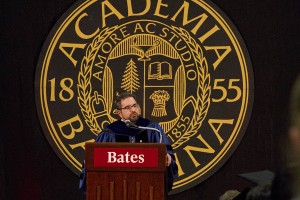
Assistant Professor of Politics Stephen Engel connected political compromise with the characteristics of a Bates education in his Convocation address. Photograph by Phyllis Graber Jensen/Bates College.
Kennedy was an apt choice of subject for Spencer’s talk. Yes, the Massachusetts senator afforded her the opportunity to share a bit of her past with a community that’s just getting to know her. More importantly, though, the senator was renowned for his effectiveness in crossing ideological boundaries in the Senate in order to get things done — in short, he was a master of compromise. And compromise was the theme of Convocation 2012.
Both Spencer’s remarks and the Convocation address by Stephen Engel, an assistant professor of politics who started at Bates in 2011, explored that theme. (The other Convocation speakers were Dean of the Faculty Pam Baker ’70, student government President Umar Khan ’13 and Multifaith Chaplain Bill Blaine-Wallace.)
Their words fell on receptive ears, or so it was hoped, as the new students’ summer reading assignment was the political study The Spirit of Compromise: Why Governing Demands It and Campaigning Undermines It, by Amy Gutmann and Dennis Thompson (Princeton University Press, 2012).
The book argues that political campaigns, on the one hand, and governing, on the other, require antithetical mindsets and skill sets. In particular, the art of compromise is essential to effective governance, as it must satisfy diverse stakeholders. But the political establishment has lapsed into a “constant campaign” mode, a sort of wartime mentality whose extreme and unwavering positions leave no room for compromise, making good governance next to impossible.
Quoting columnist Robert Kuttner, President Spencer described Kennedy as a politician who “would work with the Devil to produce progressive legislation to better the condition of regular Americans.” In other words, he practiced what Gutmann and Thompson are preaching, and Spencer offered three anecdotes illustrating how “compromise played out in the legislative process before my very eyes.”
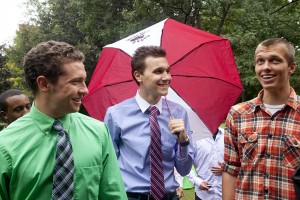
A little rain didn’t dampen student spirits on Convocation Day 2012. Photograph by Phyllis Graber Jensen/Bates College.
In two of her stories, Spencer played the zealous policy analyst raring to bend the Senate to the inevitability of her expertise — until Kennedy showed her a better way that would honor the sensibilities of their opponents and lead to legislation that would still advance the cause, while minimizing wounded feelings and keeping a light in the window for future collaborations.
Effective compromise, she told the Alumni Gym audience, “involves personal relationships, flexibility and a sense of timing” — when to press a point and when to wait. Moreover, because all people construct personal narratives that help them make sense of their lives and work, Spencer said that “part of working effectively with people is understanding that, and respecting the narratives of others.”
Spencer’s third vignette seemed especially relevant as, 830 miles away in her native state of North Carolina, the Democratic National Convention was getting under way. She recalled the aftermath of the elections of 1994, the year of the Contract with America and the Republican ascent in Congress. As Kennedy sought to preserve education funding in the face of budget-cutting pressure, he eschewed dialogue in favor of hardball tactics (such as importing Bay State students for a demonstration on the Senate floor) not to advance a specific bill, but to reframe the dialogue itself.
The lesson for the Class of 2016? “Always keep your larger goals in mind. And remember that you have to step back sometimes to reframe a problem in order to make progress.”
Making some historical detours to remind listeners that, though American politics seem dire right now, they’ve actually been worse, Engel related lessons of the assigned reading to the rewards of a Bates education.
If Bates isn’t a legislature, he said, it shares with such bodies the imperative of engaging actively with ideas. “To do so successfully, to make good on the promise that the college makes to you, our community requires the very same foundation underlying the spirit of compromise, most notably mutual respect” — a concept that he took pains to distinguish from tolerance.
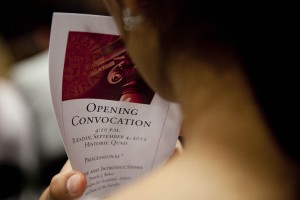 “Live and let live” is one thing, but mutual respect is more: It’s a consideration based on active engagement with the ideas of others, and on the willingness to re-examine our own ideas.
“Live and let live” is one thing, but mutual respect is more: It’s a consideration based on active engagement with the ideas of others, and on the willingness to re-examine our own ideas.
“So what we at Bates ask of you — what we challenge you to do; what we give you the support to achieve — is that you seize opportunity to scrutinize the ideas and values you hold today, to test them against others and to listen intently to people different from yourselves,” he said.
“At Bates, you have the freedom to develop your ideas, to speak and to write with conviction and depth. But that freedom demands a simultaneous commitment to be responsible for the consequences of that speech, for the impact that your ideas and actions have on those around you.”



